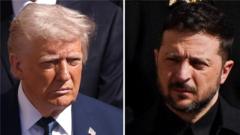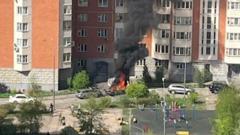In a rare moment of public disapproval, former President Trump condemned recent Russian attacks on Kyiv, while also hinting at a potential shift in U.S. recognition of Crimea.
Trump's Call to End Russian Strikes on Kyiv Amid Renewed Diplomacy Discussions

Trump's Call to End Russian Strikes on Kyiv Amid Renewed Diplomacy Discussions
Trump urges Putin to cease missile attacks following deadly strikes in Ukraine, sparking debate over U.S. foreign policy direction.
The recent attack on Kyiv resulted in the deaths of at least 12 individuals and left 90 injured, marking the deadliest assault on Ukraine's capital in nearly a year. In response, former President Donald Trump took to social media to express his discontent with Moscow’s actions, directly addressing Russian President Vladimir Putin with a call to “STOP!” Trump stated, “I am not happy with the Russian strikes on KYIV. Not necessary, and very bad timing.”
This outcry comes as Trump and key advisers have been pressing Ukraine’s President Volodymyr Zelensky to consider a plan designed by the U.S. that appears to favor Russian interests. During a briefing in the Oval Office, Trump claimed that he holds “no allegiance” to either party, emphasizing his primary objective of ending the conflict and preserving lives, while also suggesting that Putin had made a significant concession toward peace—namely, not attempting to capture the entirety of Ukraine.
The issue of Crimea remains contentious, as Trump has hinted at the possibility of recognizing Russia's claims, which would mark a drastic shift from longstanding U.S. foreign policy and could set a dangerous precedent regarding the alteration of national borders through military force. For Ukraine, this notion is particularly sensitive and unacceptable.
European officials view Ukraine's future as critical to their own stability and have expressed readiness to continue supporting the Ukrainian government, regardless of any potential U.S. retreat from peace negotiations. The situation remains fluid, with developments both on the ground in Ukraine and in diplomatic corridors across Europe and the U.S.
This outcry comes as Trump and key advisers have been pressing Ukraine’s President Volodymyr Zelensky to consider a plan designed by the U.S. that appears to favor Russian interests. During a briefing in the Oval Office, Trump claimed that he holds “no allegiance” to either party, emphasizing his primary objective of ending the conflict and preserving lives, while also suggesting that Putin had made a significant concession toward peace—namely, not attempting to capture the entirety of Ukraine.
The issue of Crimea remains contentious, as Trump has hinted at the possibility of recognizing Russia's claims, which would mark a drastic shift from longstanding U.S. foreign policy and could set a dangerous precedent regarding the alteration of national borders through military force. For Ukraine, this notion is particularly sensitive and unacceptable.
European officials view Ukraine's future as critical to their own stability and have expressed readiness to continue supporting the Ukrainian government, regardless of any potential U.S. retreat from peace negotiations. The situation remains fluid, with developments both on the ground in Ukraine and in diplomatic corridors across Europe and the U.S.






















